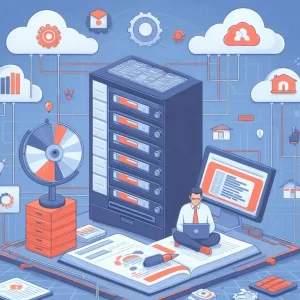“Cloud ERP” – this term is regularly surfing in the IT corridors from the past couple of years. But only a handful people truly understand its real meaning and worth. This piece of document is written to let you know the basics of both the technologies, along with their HYBRID.
Cloud computing is not a new term for the IT industry. Many mid-size companies and big organizations are adapting this technology to enhance their business capabilities. Cloud computing can easily transform the complex web of business technologies into a simple one, if applied efficiently. The strength of this technology lies in its flexible nature and easy-sharing capability. Cloud computing as the name suggests, can take care of various applications running on different local computers from a third party.
Enterprise Resource Planning (ERP)
Just like Cloud computing, the Enterprise Resource Planning (ERP) integrates various aspects and functionalities of the organization into a single system to serve all the requirements of the organization. Therefore, a smart synchronization of both the technologies can help organizations to focus on their core competencies and improve the work efficiency of all the business sectors without incurring heavy expenses.
The Cloud-ERP Relationship
Today organizations work together to make the best use of available resources (especially the IT resource), and this step helps in realizing the advantage of economies of scale. ERP along with cloud computing creates a secure and reliable platform for the execution of Information technology services. The smart use of cloud ERP helps the organization in reducing the cost for energy, maintenance, configuration and time factor, thereby improving the balance (An ideal option for SMEs).
Industry experts believe that a hybrid of cloud computing and ERP will allow the businesses to transform completely in terms of usage and payments of information technology. For example, cloud based ERP applications will eliminate the requirements of organizations to purchase the necessary IT hardware, thereby reducing the overall operation cost. However, critics point out that the issues related to ERP software installations would just move in the cloud, rather than removing them completely.
Future of Cloud – ERP
With an optimistic approach, companies are trying to develop ERP software for cloud computing environments with new attributes that were not possible using old technology. Today, various companies are dealing with cloud ERP software with an optimistic approach. Big organizations SAP, Oracle and Microsoft are experimenting on the relationship between ERP and Cloud Computing to get the maximum results and sail the ship in the desired direction.
Until that time, we can assume that cloud ERP is best only for startup companies and new segments within an existing organization.





More Stories
How to be a Successful Hosting Reseller: A Comprehensive Guide
Top 5 Essential Tools for Reseller Hosting Success
The Benefits of AWS Mainframe Migration Unleashed